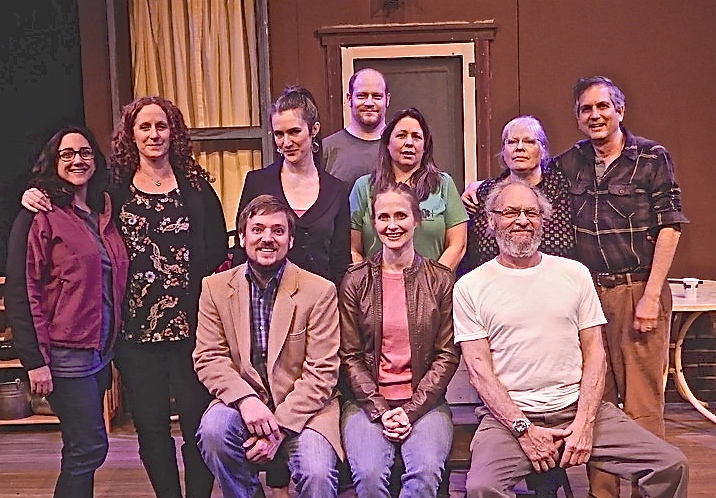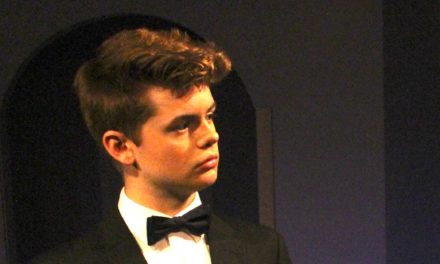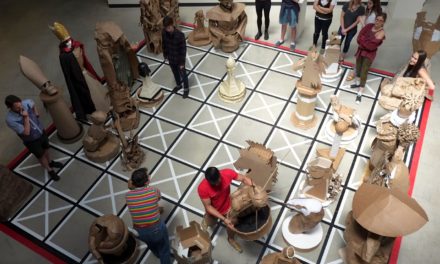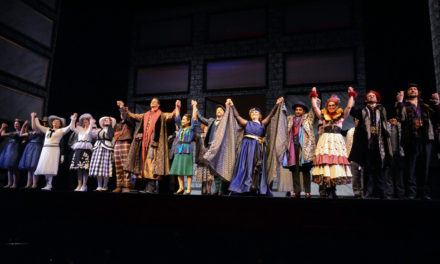(Above: The cast and crew of The Very Little Theatre’s production of Proof in Stage Left; photo by Adrienne West)
By Kelly Oristano
Then I could turn around and justify that, by saying that it isn’t really paranoia if there really are people out to get you. — Roger Zelazny, Isle of the Dead, 1969
David Auburn’s Tony and Pulitzer winning 2000 play Proof is a deceptively well-engineered and an almost impossibly well-balanced story. There are four characters, and each of the four has a conflict or confrontation with the other three. That adds up to 12 conflicts, 24 sides, and yet for all of that information and justification and anger and math and pleading and sex flying across the stage, everybody’s points are always valid. No one acts out of a need to move the drama forward to some schematized outcome; every action and statement is true and significant and in character. It’s hard to imagine Auburn didn’t do this with great intention, and it’s hard to see it as anything other than a singular accomplishment of writing.
One telling isolated example: Catherine, the central character, wants to stay in Chicago, in the house where she and her sister Claire grew up. Claire wants Catherine to move back to New York with her. From Catherine’s side Claire’s idea seems intrusive, controlling. Catherine says so from the first mention. But from Claire’s side it’s just as clearly a gesture of love and protection, and she’d be derelict as a sister if she didn’t offer. Multiply that by 12, and the play woven from this balance becomes threadbare as raw emotions peek out from behind seemingly mundane exchanges; but the interesting stuff is always happening at the frayed edges anyway.
The Very Little Theatre’s Stage Left production of Proof is touching, funny, and brilliantly acted. The material is very well respected and well presented by the outstanding cast, director Larry K. Fried, and his conscientious crew of designers and technicians. It’s magical to see a piece of theater where all the designers and the full cast and crew have “bought in” to a core concept, bringing their various professionalisms to bear on opening that shared concept to their audience. Small lovely touches such as dappled evening light for early scenes leading to stark morning light from the opposite direction in following scenes, in combination with very conscientious sound design bring an instant reality to this world. From lights up, you know where you are and you’ve been there before. Amanda Ferguson and Marc Shapiro designed the lights and Tim Rogers the sound.
The cast is simply a delight. They’re to be commended as an ensemble for doing the extra-credit work of finding the substructure of family dynamics underneath the surface of the dialogue that allow this play to go so deep. Many things are said wordlessly by all four — a quick look here, a gesture there — that help ground us in the how and why of the story.
William Campbell is perfection as Robert, the aging brilliant University of Chicago mathematician and patriarch. He’s pared down the characterization to something stark and gripping. Robert is all love, logic, and memory, only ever hinting at the depths beneath. The script never lets us see Robert’s end-of-life dementia in full flight, but Campbell masterfully shows you whence that end is coming. Campbell also designed and built the gorgeous Chicago inside-the-loop back porch set, so it plays wonderfully as an extension of himself.
Janna Slack breathes extraordinary life into Claire, the daughter who got away. She says she inherited one one-thousandth of Robert’s mathematical talent and has been able to translate it into a fortune as a currency analyst, and she seems satisfied with that if she doesn’t have to take the madness that comes with the talent. In less capable hands, Claire could become the Bad Guy of the play, but Slack has found the real, conflicted, distracted, deep-feeling human in Claire, and it’s to the production’s great benefit.
Chris Gillooly-Kress gives a smart measured performance as Hal, at once Robert’s graduate student, Catherine’s intellectual foil and paramour, and a fly in Claire’s ointment. Hal is young, bright, and completely captivated by all three members of this family. Since he’s the guest and the other three are at home, there are times when Hal has to hold his tongue or be diplomatic, and Gillooly-Kress shows the difficulty of this in his face and manner which helps convey the stakes of the drama.
But as much as it is an ensemble drama, it is after all Catherine’s story, and Erica Towe throws down an undeniable tour de force here. Catherine is onstage nearly the whole show, jumping around in time and all over the map with her intellect and her emotions and her energy level; Towe is pulling colors from a big box of crayons with the built-in sharpener. Among them — and all expertly played — are shades of tired, drunk, paranoid, brilliant, afraid, angry, superior, sarcastic, mourning, indecisive, flirty, scorned, dutiful, deflecting, ambitious, evolved beyond ambition, and no fewer than a dozen others. It’s a performance that stays with you long after you leave the theater, in all the best ways.
Astute readers will notice we’ve barely touched on the plot of the play itself. The eponymous proof is a mathematical one. Its authorship and provenance are somewhat in question. I don’t wish to say the plot isn’t important, but the play is not about the math. It is about how hard it is to keep going creatively after an initial brilliant explosion, how to keep the mechanisms of creation moving even when inspiration is lacking, and about how we help and hinder ourselves and those closest to us along that road.
It’s about how we keep ourselves warm as we contemplate the cold entropy that awaits us all. But with jokes.
Proof
When: Evenings at 7:30 p.m. on April 26-27 and May 2-4; matinees at 2 p.m. on April 28 and May 5
Where: Stage Left at the Very Little Theatre, 2350 Hilyard St., Eugene
Tickets: $14 (non-reserved seats), available at the ticket office, 541-344-7751, from 1:30 p.m. to 5:30 p.m. Wednesday through Saturday, or online at TheVLT.com












